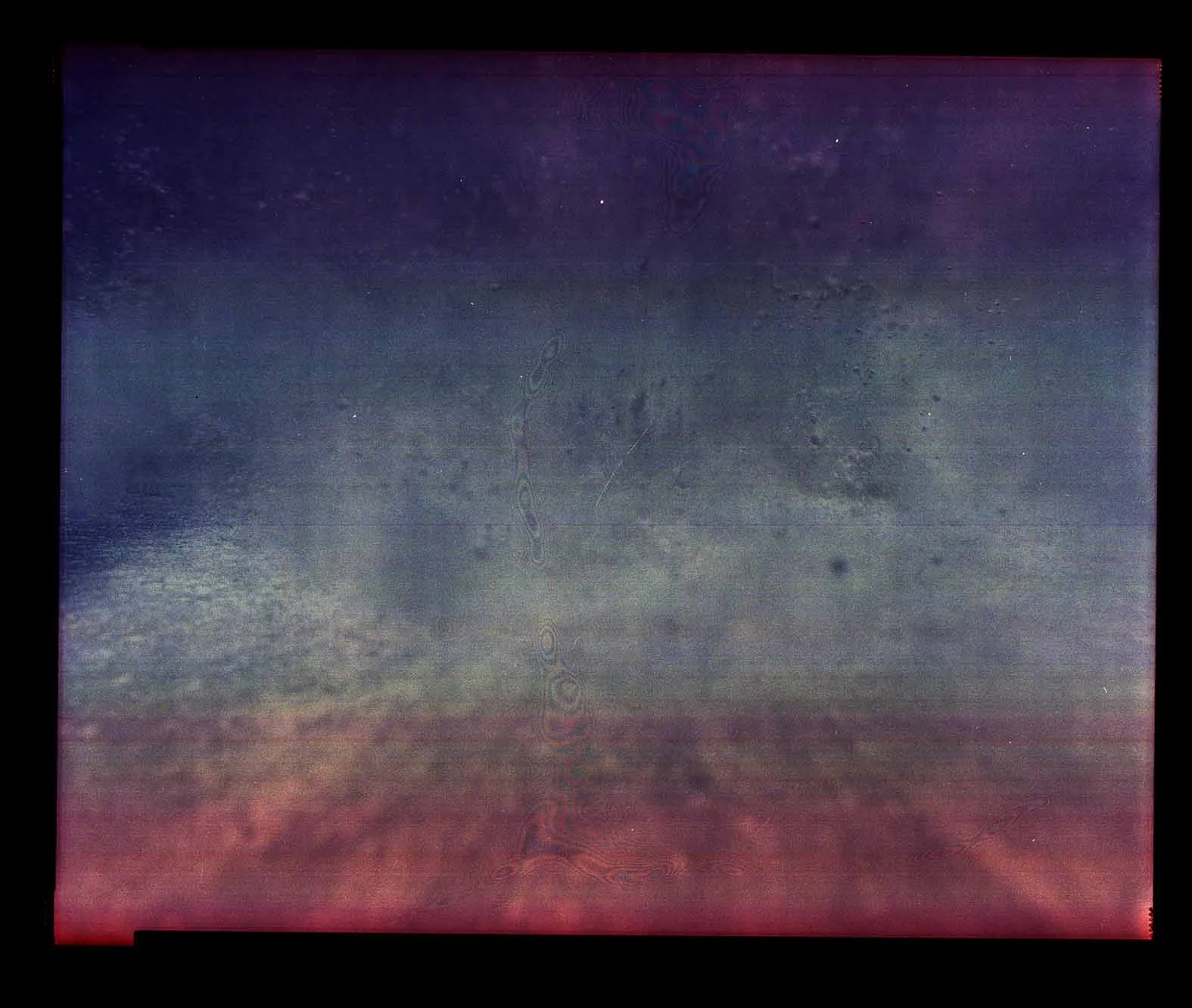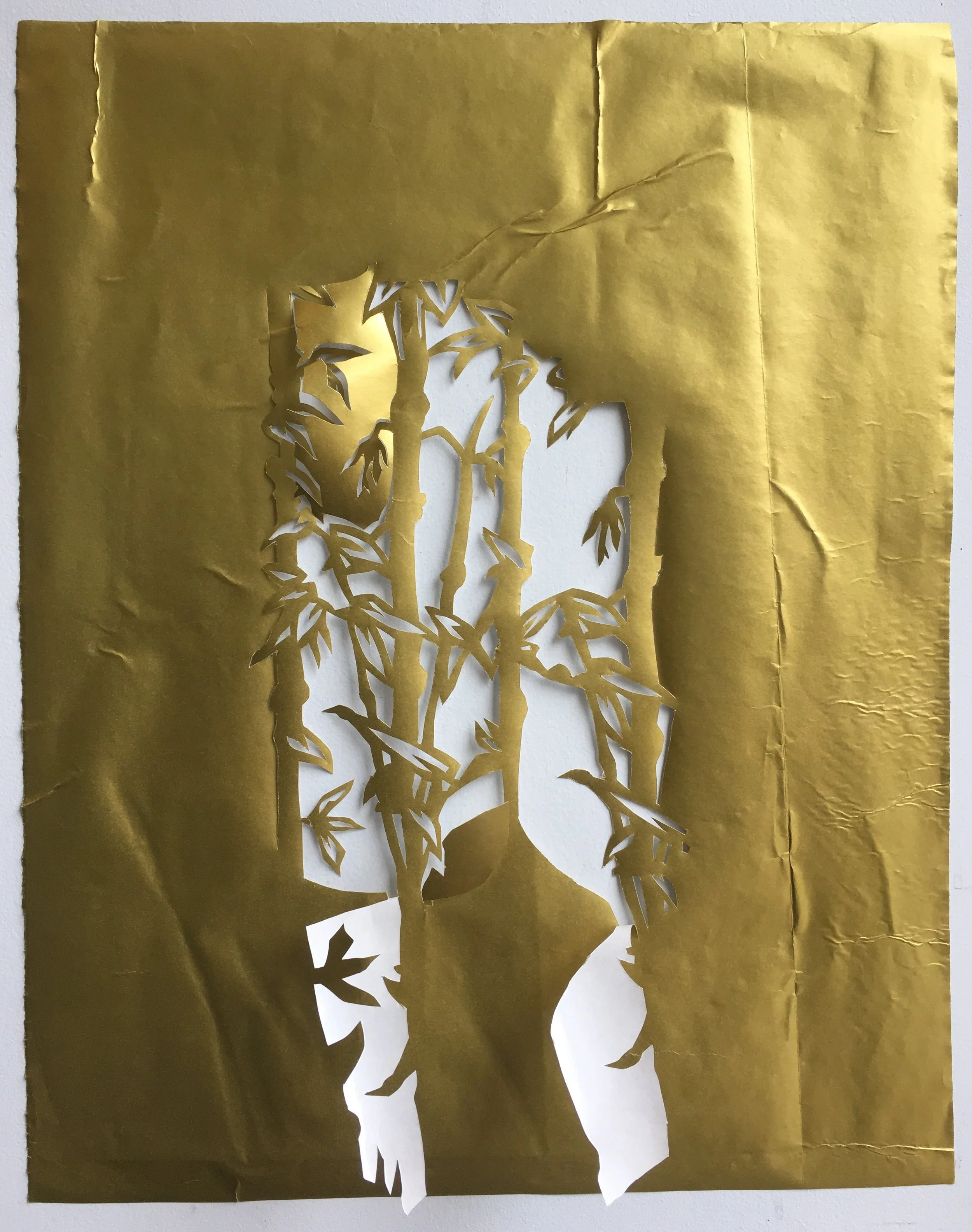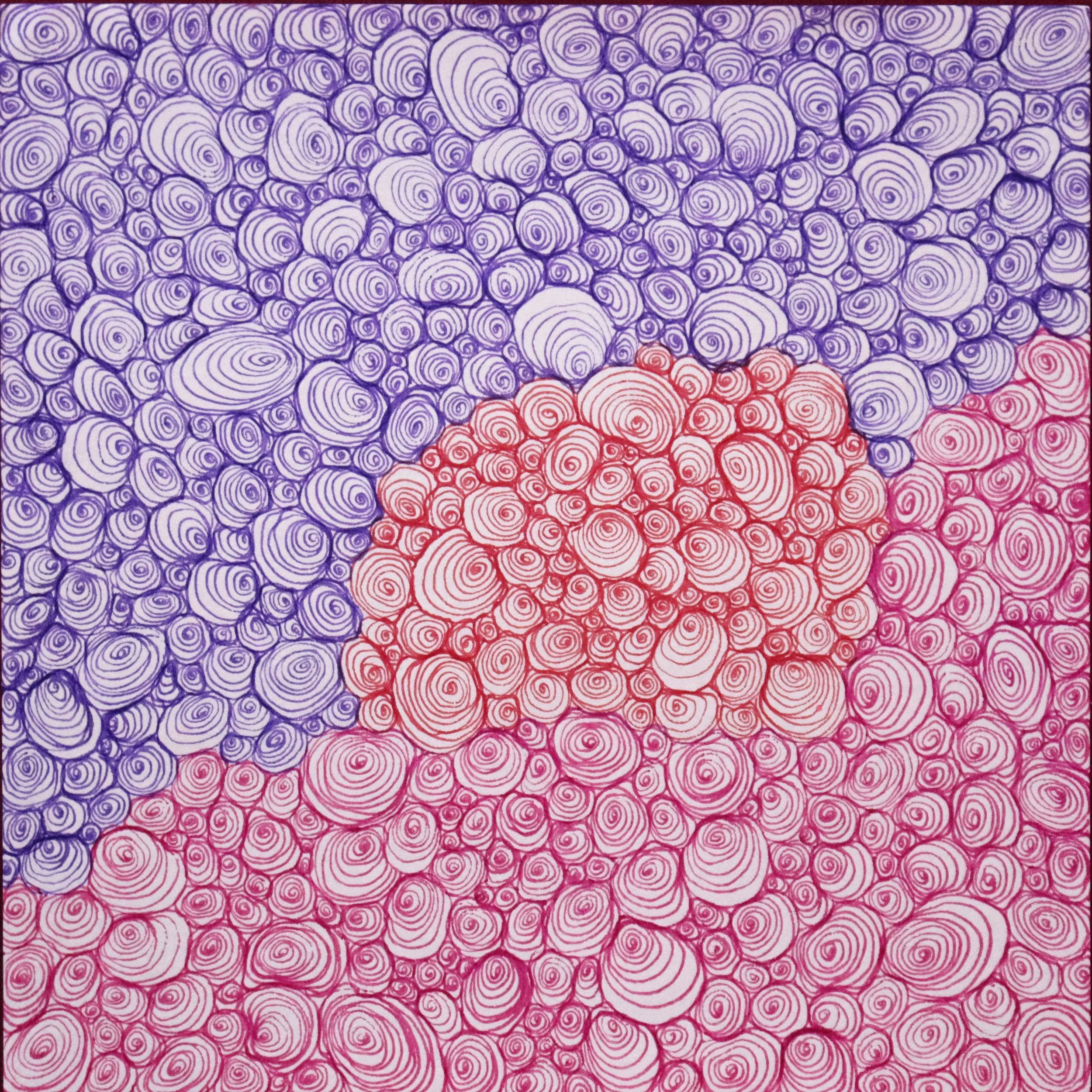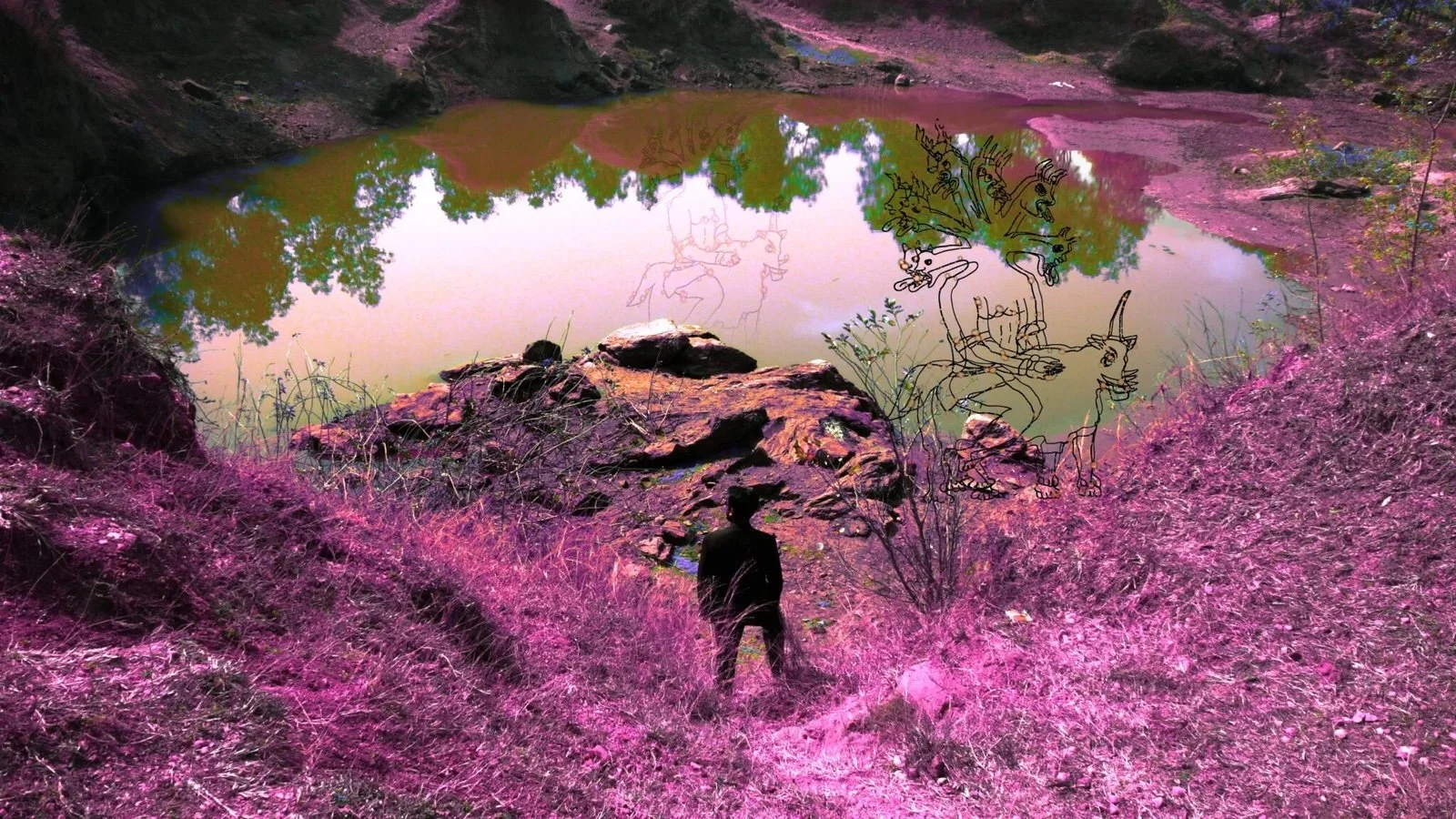Samira
By Atar Hadari
I tell you something, when the sun shining, nothing can hurt you. When you see someone, you know what they good for. You see in their face, like I see in your face, I see you kind. Some people, I go up and down, up and down the streets in the German Colony, all the way along Bethlehem Road, sometimes in the shade, sometimes not, I go all the way to their house, not a cup of water, nothing, not today, some people – you, always a kind word. How’s your wife? I saw her the other day, down by the mall. She doesn’t look so good. She doing ok? You need any jobs done, need a little help round here? You help Samira, I help you every day. I come from my village, I help you, every day, I don’t mind the journey.
Sigalit Landau - Cheri Cheri the Blue Eyed Fantasy (1997), Painted bronze, 38 × 80 × 54cm
Image description: A painted bronze sculpture of an Eastern lavatory basin in the shape of a pair of dark green legs in white shorts, kneeling over a dark orange rug. There are traditional Chinese and Arabic characters written above each knee.
You and me, we’re like one family. You know my son, with the leg? He’s not very well. I come, I don’t mind, every day, the check point doesn’t bother me – I was born here, they can’t stop me coming. I come every day to get food for my family. But when his leg needs a new hip, that I can’t get on Bethlehem Road. That I need some help. You know your wife? I told her about my son, when I saw her. She said you’d help. She said she was sorry. What good is sorry, I tell her, it comes from Allah, you want to be sorry? A little help for someone in your family, then you don’t have to be sorry for anything. You been living here long? You look like you belong here. You grow anything in this garden? Back in my village, this much land, you could feed all your children. You only have that one? Inshallah, next year, you’ll have another one. Then you can plant this garden with what – carrots, onions, turnips? You feed them, all strong sons. You need any help with your garden?
My son? Thanks for asking. Not good. The hip, the hip all rotten. Fifteen and he needs a hip. Is that funny? I’m an old woman, my hip’s like iron, he’s a boy barely shaves, his hip snaps like a twig. Allah. He knows what he’s doing. But I have to find the medicine. Money. You sure you know what you’re doing with this garden? You want a little help? Ok. Sure, sure. Thursday. I bring my brother and husband’s brother. They help. They very good potato planters. The best. They make this patch of grass an oasis. You’ll look out of your window you won’t know where you live, so many onions coming from the ground. You won’t be able to walk to the gate, you’ll have to fight so many leaves. Ok. Till Thursday. Give my love to your wife. She looks like she needs a little something.
You know my son? His leg is worse. I say his leg, really his hip but he tried to walk, stupid boy, to get me a glass of milk. Since he was so high he been trying take care of me. Isn’t that stupid? He’s too stupid to stay off his hip which is rotten, so now he broke the shin as well, where he fell down into the rock-hard garden we got ‘cause we can’t get any water, not like here. What’s that? You got trouble with water. Everybody got trouble with water. Your wife? What’s the matter with your wife? I saw her again the other day, circles under her eyes and she looked as white as that glass of milk my son spilled... she got frightened? What’s there to be frightened about water? Zionists? Eh, I don’t mean to be anything but, Mister, you have a kipah on your head and a beard – it’s not so long but it’s there. I think my brother and my husband there, they probably think you’re a Zionist too. Your wife she’s scared of Zionists? How you get that kid you playing with? Ah, not you. She got other Zionists. You got Zionists knocking on you door, too? How come? This is Jerusalem, and you wife and you look – well – you look pretty close to Ben Gurion to me – how come you got? You had people in your yard. Ah, neighbours. Tsk. I know about neighbours. Thing about neighbours is, you can’t shoot them because they can always shoot back. I’m just kidding, honestly. I’m not political. So what did your neighbours do? Friends of your neighbour – what did they do? They came by and watered your garden. Hmm. I don’t get it. They washed your windows? No. They splashed on your patio? No. I give up. What did they do your wife didn’t like? She’s scared of Zionists? Well, I don’t know to tell you, me, sometimes, Samira gets a little scared too. But if they wanted to come water my garden, you know what I’d say, Begin and Ariel Sharon they can come too. They want to water Samira’s garden, I give them tea, a little sumsum, maybe cake.
She hid under the bed? That’s not good. Your wife hid under the bed when the Zionists came? Does she like it here? I not sure if I like Israel, you know, I love Jerusalem but I don’t love every check point, but I never hid under my bed when the IDF go by. She hide under the bed when the neighbour friend come water your garden, I think you need help from more than Samira. I think maybe she want more than onion growing in this ground. She pregnant again? Praise Allah. I’m sure she look into that baby face, she see a big fat Zionist can chase off all the neighbours and get back all your water rights. No Zionist going to push your baby around, he going to be big and strong and kick them back where they belong. Right? So where you want us to start with digging this ground?
My son’s leg? Ahmed – how many stitches in Hassan’s leg? Forty-seven? You tell lies like an elephant. How I got married to that man I don’t know. I loved his lies and then I had a wedding and a son before I was seventeen. But no – it wasn’t forty-seven or thirty-seven. Maybe twenty stitches. We got a nurse in the village can do stitches. The hip is what I need to dig your garden for. Don’t be silly, I’m not expecting to take all your money. You see my teeth? All rotten, like my son’s hip, but one or two is made of gold. So. Like that. I just want one or two teeth made out of gold, to dig out of your ground. The rest can be rotten teeth. I’m used to eating with them. I bite hard no matter what my tooth is made of. I can bite into metal since I’m little. I don’t feel anything anymore. You want your onions here? Or I got carrots. These, very special carrots. Not like what you buy in the supermarket. Are you kidding me? You joking with Samira. You think you could go to your supermarket and buy carrots and just put them in the ground and wow they come up. You have a little bit to learn about this garden, even if you do belong here. You don’t get anything from just a little sweat. You find the right place, you find the right kind of carrot, you make the right hole, you put the water in the right way. You trust Samira. My brother and my husband they start digging now, right now, right after they eat. And you see. You see if you can walk out of this gate, before the new year. I make a deal with you. You walk out of this gate by new year and I’ll give you back my poor son’s hip. You can have it instead. It can make your salad bitter, instead of the onion. Just joking. I know you wouldn’t eat onion with your salad. You look like you like things sweet.
What about flowers here? You don’t got room for flowers? What about your son – your son doesn’t want to pull up things? You don’t give him flowers to pull up, he’ll pull up onions. He’s a Zionist, isn’t he? Give him flowers to look at or he’ll take away you land. Zionists love to water things so they look like Poland, I heard all about it on Channel 1. You want they start to dig? They finished their hummus. Thank you very much for the water in the cups. Really. You wouldn’t imagine how many people we go work for never offer you a cup touched their lips. I won’t come in. I stay out here with my husband and brother. You go in, get your little Zionist under the shade. He’s only little. Let him crawl a little, while he has the use of his leg.
Sigalit Landau - Woman Giving Birth to Herself (2016), 216 x 70 x 117cm
Image description: A red bronze sculpture of a pair of legs in a running position, one leg balanced on a green ball on a black cube. At the waistline the head and raised arms of a woman are being pushed through an opening.
That’s it. We come back tomorrow, water the plantings, put a few more things into the holes. Over there, you got onions. Over there, potatoes. Over there, carrots. No flowers, not an inch that’s flowers. You can trust me on that. You won’t have poppies come up like the Wizard of Oz? You see that movie? We see that movie all the time in Palestine. When she clicks her heels together and says, “There’s no place like home” – every little boy and girl in Ramallah says, “No place like home”. I don’t believe in the flying monkeys. I think that some silly Jew wrote that in America. But the cowardly lion, and the witch, and the scarecrow – we all believe in scarecrows who haven’t got any brains. How’s your wife doing? She crawled out from under the bed yet? What you mean she had another scare? Yeah I know it was Independence Day yesterday. We call it Nakba but it’s more or less a direct translation. You don’t celebrate? Sure we celebrate. Oh yeah, now you mention it, I guess there are celebrations in this street. Who marched up here? The Bnei Akiva – who they? – the little Zionists? What they do, fire water pistols? Oh, wave flags. That’s nice. Who else marched? The Palestinian youth? Ah, that’s funny. What did they do – throw potatoes? I’m joking. You got us planting potatoes, what you need the little Palestinians for – what they do, really? They marched and waved flags. Ok – what’s your wife’s problem? She under the bed again? Oh – she couldn’t tell the difference. You tell her – the Palestinian kids were the ones singing in Arabic and looking over their shoulders. She wants, I’ll come over next Nakba and point them out to her. We can eat the onions, sitting together in the shade. I see you tomorrow, we all come finish to plant.
How you doing today? My son’s hip better, thank you. Well, the bone starting to knit. We see how he walks when the cast it come off but, thank Allah, I got the hip, he got the doctor. I was born here, you know, I told you. But my husband, my husband, like my son, was born in Bethlehem, so they get no free doctor. They pay. That’s why he dig your land. What you mean you want no more? Your wife doesn’t want the vegetables? She crawled under the bed again – I come inside and help you drag her out. She not under the bed? She gone to your neighbour. What neighbour? Oh, friend. A woman friend or man friend? Oh, woman friend – then she could still come back. Where your boy? You let her take him? What kind of Zionist are you? I didn’t think Zionists were like that. Soft. You tell her this. She should come back to this garden. She don’t want me to water it, I won’t water it. She don’t think Samira is Zionist eh? She not that far gone. You tell her, I don’t march here next Nakba and nobody else march here next Nakba. I sit with her and we eat onions together. Tell her I want her to come back and meet my son. I want your son to chase my son. By the time he walking, my son be walking again. And we all sit here and eat onion together. You like onion? I want her to eat onion with my son because marching don’t get you your garden back. Just a little onion here, a little onion there. You plant enough onions before you know it every Zionist know your name and maybe, just maybe, when you get into an argument with him about the water – nobody start shooting. Just a little argument. Between neighbours. You like that uh? You tell her the Zionist is in her belly and she got to come back here, just like I had to go there. I had to go there because I had my husband’s baby in between my rib cage and no matter how much I wanted to be in Jerusalem, I knew where I belong. And she now belong here. You tell her that. And you come back and we eat onion together. I want her to eat onion with my son. You tell her that, ok? I want her to sit and eat onion with me on Nakba day and we go look together at the boys go marching with their flags and we spray them with water. You do that for me, say that to her? I won’t let anybody chase her under the bed. I be a friend to her. You tell her that. I think she need a friend to save her from the Zionists. Tell her, if I can live with them, maybe she can too. I be her family. I told you, we all family. You go tell her and I plant one more thing for you. A flower. Right here. You tell her to come back and watch it grow, so she can be here when her son comes to tear it out.
Atar Hadari trained as an actor before studying play-writing with Derek Walcott at Boston University. His plays have won awards from the BBC, Arts Council of England, National Foundation of Jewish Culture (New York), European Association of Jewish Culture (Brussels) and the RSC, where he was Young Writer in Residence. His plays have been staged at Finborough Theatre, Wimbledon Studio Theatre, Chichester Festival Theatre, Mark Taper Forum and West Yorkshire Playhouse. His sitcom script “Strictly Kosher” won an Alfred Bradley award from the BBC. His Songs from Bialik: Selected Poems of H. N. Bialik (Syracuse University Press) was a finalist for the American Literary Translators’ Association Award., His first poetry collection Rembrandt’s Bible was published by Indigo Dreams. The Pen Translates award-winning Lives of the Dead: Collected Poems of Hanoch Levin is out now from Arc Publications.
*
Sigalit Landau, an interdisciplinary artist who works with installation, video, painting, photography, and sculpture. She currently lives and works in Tel Aviv.
If you’ve enjoyed reading this article, please consider making a donation. Your donation goes towards paying our contributors and a modest stipend to our editors. Singapore Unbound is powered by volunteers, and we depend on individual supporters. To maintain our independence, we do not seek or accept direct funding from any government.











‘But later… we didn’t talk about love. We talk about the land and its people.’ – a short story by Kaushik Ranjan Bora, translated from the Assamese by Aruni Kashyap.